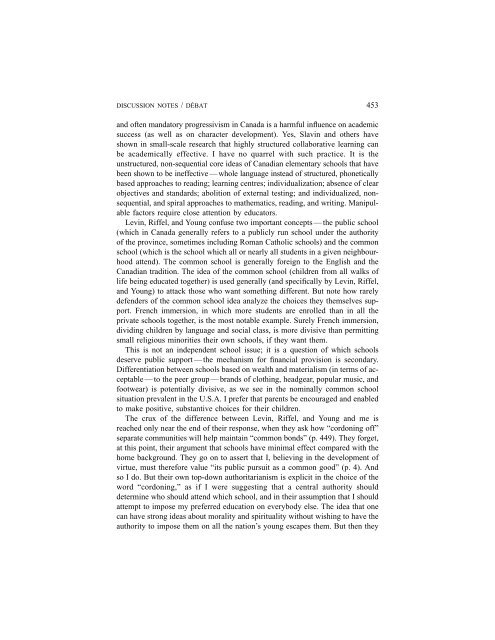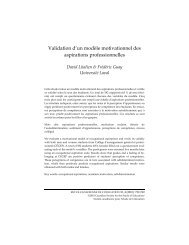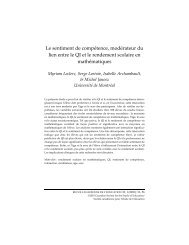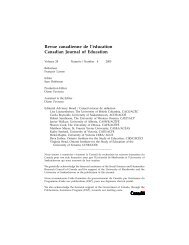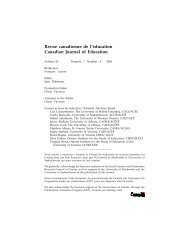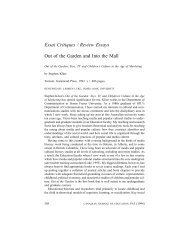Mireille Falardeau et Michel Loranger Le choix de stratégies ... - CSSE
Mireille Falardeau et Michel Loranger Le choix de stratégies ... - CSSE
Mireille Falardeau et Michel Loranger Le choix de stratégies ... - CSSE
You also want an ePaper? Increase the reach of your titles
YUMPU automatically turns print PDFs into web optimized ePapers that Google loves.
DISCUSSION NOTES / DÉBAT 453<br />
and often mandatory progressivism in Canada is a harmful influence on aca<strong>de</strong>mic<br />
success (as well as on character <strong>de</strong>velopment). Yes, Slavin and others have<br />
shown in small-scale research that highly structured collaborative learning can<br />
be aca<strong>de</strong>mically effective. I have no quarrel with such practice. It is the<br />
unstructured, non-sequential core i<strong>de</strong>as of Canadian elementary schools that have<br />
been shown to be ineffective — whole language instead of structured, phon<strong>et</strong>ically<br />
based approaches to reading; learning centres; individualization; absence of clear<br />
objectives and standards; abolition of external testing; and individualized, nonsequential,<br />
and spiral approaches to mathematics, reading, and writing. Manipulable<br />
factors require close attention by educators.<br />
<strong>Le</strong>vin, Riffel, and Young confuse two important concepts — the public school<br />
(which in Canada generally refers to a publicly run school un<strong>de</strong>r the authority<br />
of the province, som<strong>et</strong>imes including Roman Catholic schools) and the common<br />
school (which is the school which all or nearly all stu<strong>de</strong>nts in a given neighbourhood<br />
attend). The common school is generally foreign to the English and the<br />
Canadian tradition. The i<strong>de</strong>a of the common school (children from all walks of<br />
life being educated tog<strong>et</strong>her) is used generally (and specifically by <strong>Le</strong>vin, Riffel,<br />
and Young) to attack those who want som<strong>et</strong>hing different. But note how rarely<br />
<strong>de</strong>fen<strong>de</strong>rs of the common school i<strong>de</strong>a analyze the choices they themselves support.<br />
French immersion, in which more stu<strong>de</strong>nts are enrolled than in all the<br />
private schools tog<strong>et</strong>her, is the most notable example. Surely French immersion,<br />
dividing children by language and social class, is more divisive than permitting<br />
small religious minorities their own schools, if they want them.<br />
This is not an in<strong>de</strong>pen<strong>de</strong>nt school issue; it is a question of which schools<br />
<strong>de</strong>serve public support — the mechanism for financial provision is secondary.<br />
Differentiation b<strong>et</strong>ween schools based on wealth and materialism (in terms of acceptable<br />
— to the peer group — brands of clothing, headgear, popular music, and<br />
footwear) is potentially divisive, as we see in the nominally common school<br />
situation prevalent in the U.S.A. I prefer that parents be encouraged and enabled<br />
to make positive, substantive choices for their children.<br />
The crux of the difference b<strong>et</strong>ween <strong>Le</strong>vin, Riffel, and Young and me is<br />
reached only near the end of their response, when they ask how “cordoning off”<br />
separate communities will help maintain “common bonds” (p. 449). They forg<strong>et</strong>,<br />
at this point, their argument that schools have minimal effect compared with the<br />
home background. They go on to assert that I, believing in the <strong>de</strong>velopment of<br />
virtue, must therefore value “its public pursuit as a common good” (p. 4). And<br />
so I do. But their own top-down authoritarianism is explicit in the choice of the<br />
word “cordoning,” as if I were suggesting that a central authority should<br />
d<strong>et</strong>ermine who should attend which school, and in their assumption that I should<br />
attempt to impose my preferred education on everybody else. The i<strong>de</strong>a that one<br />
can have strong i<strong>de</strong>as about morality and spirituality without wishing to have the<br />
authority to impose them on all the nation’s young escapes them. But then they


